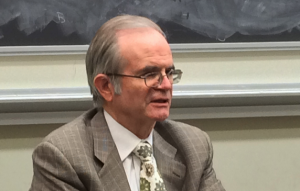A former managing editor of the Wall Street Journal shared his experiences with the College regarding the start and successes of his brainchild, the nonprofit investigative news organization ProPublica, on Tuesday, Nov. 19.

Paul Steiger, now executive chairman of ProPublica’s board of directors, worked for the Wall Street Journal until the end of 2007, when he started ProPublica with the financial support of Herbert and Marion Sandler, former chief executives of Golden West Financial.
“So off we went,” Steiger said. “The model was this: It was going to be not-for-profit. We were going to shine the spotlight on abusive power and failure to uphold the public interest by anyone in power … everything we write goes out for free on our website.”
Dedicated to investigative journalism, ProPublica seeks to expose abuses of power and then offers the stories free of charge to larger news platforms, where the stories can reach audiences most likely to be able to enact change.
“We don’t lobby,” Steiger said. “We use only the techniques of journalism, but we try to put the story in front of people that can respond to it.”
Steiger spoke about a ProPublica story that exposed a legal loophole in California, where it once took fired nurses up to six years to lose their nursing licenses. Many of the nurses — who were abusive toward patients — were rehired in other hospitals almost immediately, continuing the cycle of abuse.
Steiger mentioned an instance in which a reporter encountered a nurse on the verge of replacing a patient’s drugs with saltwater. Surprisingly, the nurse expressed gratitude at being caught.
“One guy (said), ‘I’m so glad you found me. Please stop me before I do this again,’” Steiger said. “He realized he was so addicted that he was going to steal patients’ drugs again.”
After the story broke, the state government fired the board in charge of inspecting nurses’ licenses and rehired a new group to solve the issue.
ProPublica has engendered change with many of its investigative pieces. While some stories are noticed almost immediately, others take longer. But despite its difficult start as a nonprofit news organization, ProPublica has enjoyed great success, Steiger said.
“We’ve gone from brand new to being recognized nationally in journalism,” Steiger said. “It’s hard work but it’s fun.”
Steiger also spoke about notable moments of his career at the Wall Street Journal, particularly the story about the attacks on Sept. 11, 2001.
“It was just so interesting for someone to have seen so much in history and to hear that one of his favorite things that he wrote about was 9/11,” junior political science major Niriksha Kannan said. “Even though we were all really young, we all have our own memory of that experience.”
Steiger has vivid memories of that day as well, down to the “best blue suit” he wore, which later became covered in ash and dust.
“Our office was right across the street from the World Trade Center,” Steiger said. “First plane, wasn’t sure what it was. Saw the second plane, knew what it was.”
After the office was evacuated, Steiger sent his best three editors on the last ferry to an office in South Brunswick, N.J. With five other editors in an apartment, Steiger contributed to a breaking story that would later win a Pulitzer Prize.
“It’s not that I had so much to do with it personally,” Steiger said. “We each wrote two words in the headline. But it’s that people knew what to do, that they understood that getting the paper out was very important. We had people from all over the country say, ‘Seeing that paper in our driveway was an important piece of reassurance the day after 9/11.’”
Steiger ended his discussion with some advice for anyone aspiring to go into business or journalism. For business majors, he suggested “(working) your ass off in college,” getting internships and possibly pursuing another degree.
He also suggested a less conventional route for those interested in finance. Kara Kettelkamp, president of Delta Sigma Pi, the business fraternity that brought Steiger to campus, took his words to heart.
“I do like to write, but I’ve never seen it as a career aspect — more of a hobby,” Kettelkamp said. “He mentioned financial writers being needed, so that sort of sparked in my head a possibility.”
For those aspiring to be journalists, Steiger said that there are risks, but the rewards can be great. The journey also requires a great deal of independence and initiative.
“If you’re going to do journalism, you’ve got to be prepared to depend not only on the organization you work for, but also on your own reputation, your own name, your own byline, your own image,” Steiger said. “There are always opportunities. You have to accept the risks.”






